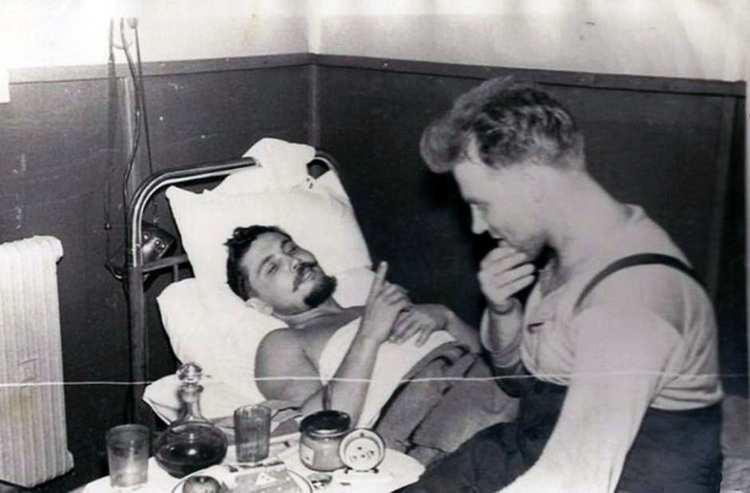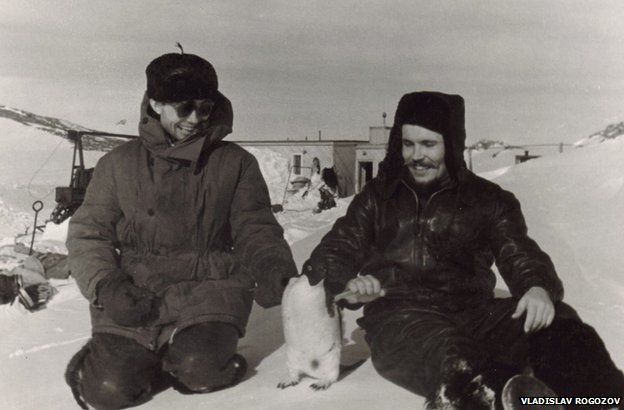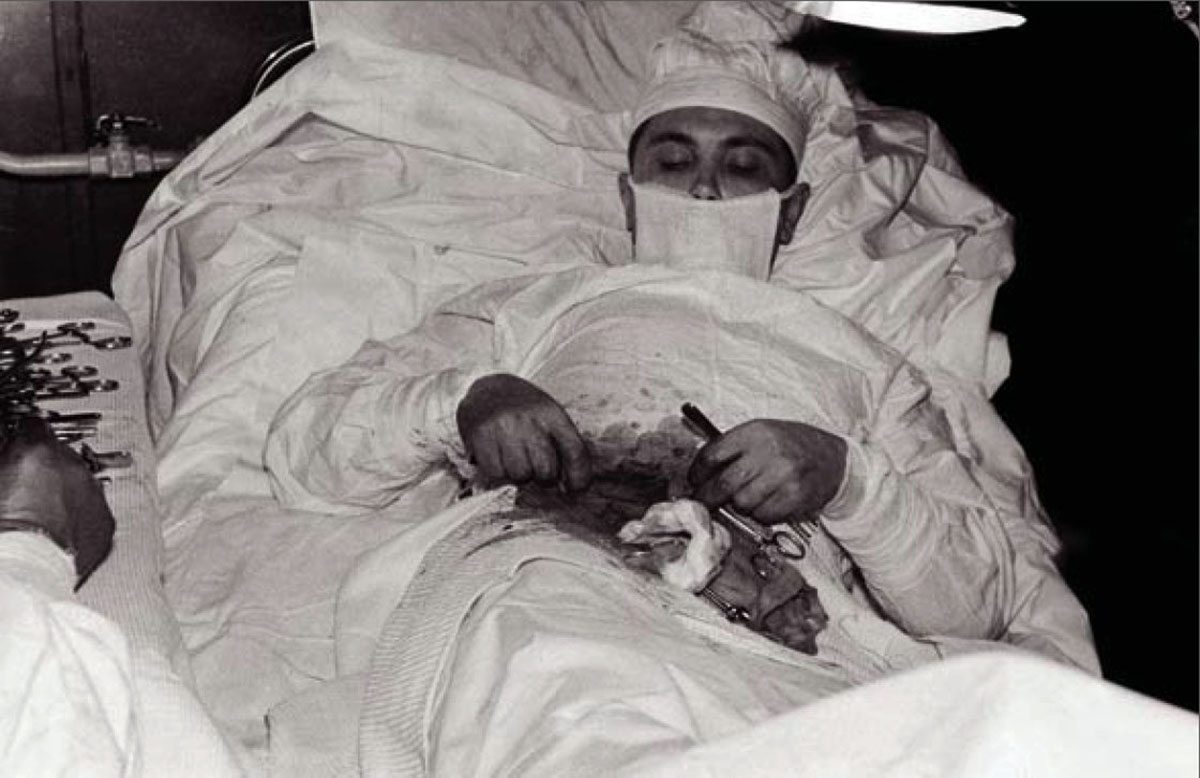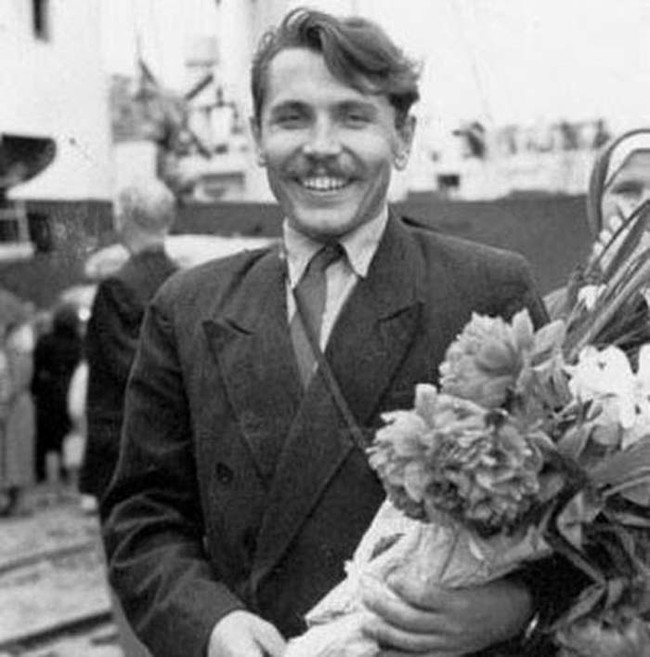
An Antarctic expedition comes with its set of challenges. But what the Russian surgeon, Leonid Rogozov had to contend with, no one saw coming.
The year is 1961 and Rogozov was part of the sixth Soviet Antarctic expedition team. The purpose of the team of twelve was to build on the Schirmacher Oasis a new Russian base.
By the middle of February 1961, the base-called the Novolazarevskaya Station was already functional. Now, what lied ahead of the team was the extremely hostile Antarctic winter.

Leonid Rogozov(R)
But with the Polar winter came bad tidings for Rogozov. He began to feel weak and nauseous. The problem was compounded when a severe pain manifested on the right part of his abdomen. The surgeon that he was, Rogozov easily identified the problem as appendicitis.
However, the issue was with operating it. Being the only surgeon on the ship and the nearest hospital facility more than a few miles away, this was a challenge he couldn’t easily rise up to.
The problem gets worse
By the end of April, 1961, the situation has deteriorated so much that the surgeon’s life was in danger. Getting help from outside was out of the question-the heavy snow and blizzards made the atmosphere a sheet of white and flying possible. The ship itself, which took 36 days to reach the Antarctic from Russsia would not return for another year.
In other words, fate gave Rogozov a clear set of two options: do something now or perish
Rogozov-then 27 years old acknowledged the situation. He knew that if his appendix burst chances were high that he will die of it. Also, he did not have too much time to ponder and decide a way forward-the more he waited, the worse his symptoms got.
He knew that his only chance was in opening his abdomen and taking out the intestines-a procedure he has performed many times. Now the question was whether he will be able to do it on himself.
The situation also had a political aura in that this was happening during the Cold War. Both Russia and America were vying for supremacy in the outer space, nuclear and polar arenas. Negative publicity at such a time wouldn’t help the Russian cause much.
Indeed, the commander of the base procured blessings from Moscow for the operation.
The pain, as recorded by Rogozov
The pin that Rogozov suffered is evident from the diary entries he made during the period. One entry has phrases like “a snow storm whipping through my soul wailing like 100 jackals.” In another , Rogozov relates how even though no symptom of an imminent perforation exists, he has a foreboding feeling.
But Rogozov didn’t let the pain and the negative emotions pull him down too much. He was determined enough to devise a detailed plan to operate on himself. He chose two of his colleagues as main assistants, assigning them specific tasks. He planned to operate by looking at the reflection in a mirror. The assistants were to hold the mirror, position the lamp correctly and also hand him the surgical instruments.
Rogozov had even given instructions for what to do in case he lost his consciousness-the way to inject him with adrenalin and also perform artificial ventilation if required.
The self-surgery

Using a general anesthetic for the surgery was impossible -Rogozov would need to think straight if he is to see the procedure through. He did apply a local anesthetic to the abdominal wall. However, after he cuts through it, removing the appendix must be performed without using more pain relief. It’s quite evident that the procedure must have been as painful for Rogozov as it was a hard spectacle for his assistants.
In fact, the station director was also present during the surgery, just in case either of the assistants passed out.
Rogozov writes in his diary that when he looked at his assistants at the last minute, they looked whiter than white. He also says that even though he was scared, once he picked the needle with the novocaine and gave himself the first injection, he automatically switched to operating mode. From there on, his focus was on the surgery alone.
Trouble mounts with the surgery
But that doesn’t mean the surgery proceeded smoothly from that point on.For one thing, the mirror wasn’t a help as he hoped. The inverted view it offered was too much of a hindrance. So, he proceeded to work with touch, without using gloves. And as the last and hardest part of the operation came around he nearly lost consciousness. Losing in the surgery became a very real prospect.
By this time Rogozov was bleeding heavily. While he opened the peritoneum, he ended up injuring the blind gut which then had to be sewed up. In one diary entry, he relates how he grew progressively weaker. His head started spinning and he had to rest for 20 to 25 seconds every four to five minutes.
With literally painful patience, Rogozov performed the surgical motions and eventually reached the appendage- “the cursed appendage!” as he says. He noticed that there was a dark stain at its base-an indication that one more day would have made it burst. By that time, his heartbeat has slowed dramatically and his hands felt like rubber. After having come this far, Rogozov thought that he was going to fail.
But survived he did. He applied the final stitch after almost two hours of painful procedure. And before allowing himself sleeping tablets and antibiotics, Rogozov instructed the assistant on washing the instruments. Rogozov let himself be guided to sleep by the drugs only after seeing the room clean.
Just two weeks after that, he rejoined his regular duties.
Another problem arises
But that wasn’t the end of the ordeal.
The weather that year was especially bad. This, along with the richly thick ice prevented the ship which was scheduled to pick the team up in April 1962 to reach them. The team of explorers began to think that another year in Antarctica was in store for them.
Related to this period, Rogozov makes a diary entry that shows how home sick he was, even mentioning how odd it was that he agreed to join the expedition in the first place! On a professional note, he mentions how he misses his clinic- a place he loved “more than any worldly pleasure.”
However, the team has reason to cheer when it’s learnt that they will be airlifted out.Single-engine planes were used for the purpose. A bit of drama happened then too as one of the planes nearly dropped into the ocean.
The triumphant return

Rogozov was given a hero’s welcome when he arrived back. And his story of survival was put to good use by the Soviet propaganda machinery. He was awarded the Order of the Red Banner of Labour: an honour reserved for those who perform great services to the Soviet state and society.
Celebrated though he was, Rogozov kept himself away from the public eye. The day next to arriving home, Leonid Rogozov rejoined his hospital where he picked up his career from where it was left off.
Image credits: rarehistoricalphotos, BBC